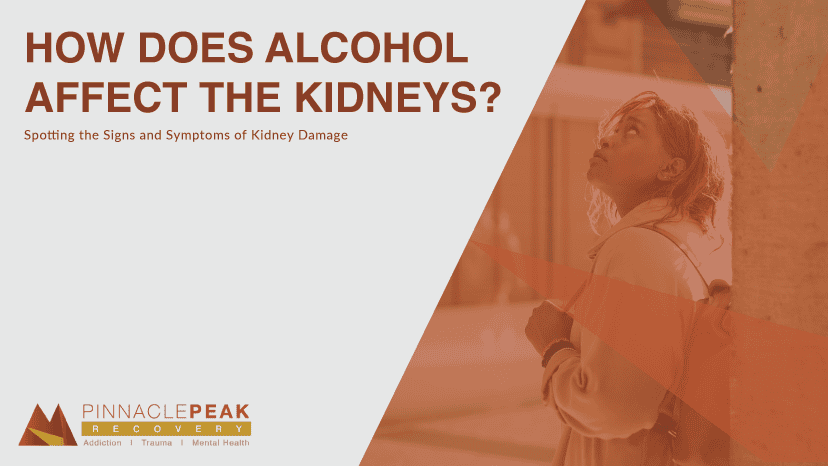When you think of the negative effects of alcohol, the first thing that might pop into your mind is the hangovers experienced after. Maybe you think about how the liver can be damaged over time. You may have also heard the stories about alcohol withdrawals and how they cause seizures. But did you know that alcohol use can also impact our kidneys?
In 2022, nearly 1 in 5 Arizona adults reported binge drinking at least once in the past month. Here at Pinnacle Peak, we’ve seen firsthand the long-term effects of alcohol use. While many facets can be addressed in recovery, some of the physical damage done by alcohol can reach a point of no return. To help our community make more informed decisions about their health, today we’re going to answer the question, “How does alcohol affect the kidneys?”
How Does Alcohol Impact the Kidneys?
The kidney is part of the filtration system in our body, similar to the liver. In particular, the kidneys help filter waste and other unused or unneeded substances that are found within the blood. Once this process is done, the end product results in urine and is deposited in the bladder.
There’s a reason urine tests are common as a form of drug test and that’s because of how much of a substance exits the body through urine. The same is true with alcohol. With long-term or frequent alcohol consumption comes damage to this delicate process, due to the regular exposure of alcohol to the organs. Alcohol is, in fact, toxic to the body.
The Short and Long-Term Effects of Alcohol on the Kidneys
Anytime a substance like alcohol is consumed, there are immediate effects and effects that can build up over time. Both of these effects can play a role in our overall health, so it’s important to be aware of them.
In the case of alcohol and the kidneys, the damage done to the kidneys can be traced back to the liver.
When the liver starts to develop liver disease from alcohol use, it can negatively affect the balanced rate of blood flow to the kidneys. Whether increasing or decreasing the amount of blood the kidney receives, this can cause an unbalance in the process of filtering our blood. Let’s take a look at the two ends of this spectrum.
Diuretic Effect of Alcohol
On its own, alcohol acts as a diuretic to the body. A diuretic is something that promotes the production of water loss in the body through urine. This happens due to alcohol effecting a hormone within our body known as vasopressin, which helps regulate how much water we excrete.
Since urine is produced in the kidneys, this change in regulation can cause additional strain on them. Combine this with the chemical compounds left behind from alcohol consumption, and you can truly start to damage the kidneys as time goes on.
Dehydration and Kidney Function
When we’re excreting more water than we are taking, this can lead to dehydration. Dehydration is very common with alcohol consumption and is actually a key component in the side effects of hangovers.
No matter what the cause of dehydration, it is not good for our kidneys. Frequent dehydration is a contributing factor in permanent kidney damage, but why is that?
Have you ever noticed that when you drink more water, your pee is a lighter yellow color? This is due to the minerals and other wastes in our body having more water to be able to be processed. When there’s less water in our body to excrete in the first place, this doesn’t mean there’s also less waste. Instead, the same amount of waste is output into a smaller amount of water.
This higher concentration of minerals and wastes can eventually lead to crystals forming inside of your kidneys. These crystals negatively affect kidney function and can lead to kidney stones or other kidney diseases.

The Most Common Alcohol-Related Kidney Disorders
While, unlike the liver, there aren’t any specific kidney disorders named after the effects of alcohol on the kidney, this doesn’t mean alcohol-related kidney disorders don’t exist. The conditions that develop due to alcohol consumption often result from a trickle-down effect of alcohol’s overall impact on the body.
Alcoholic Kidney Disease
One of the conditions that can happen in late-stage alcohol use is nephropathy. To put it simply, this condition revolves around the deterioration of kidney function. This decline can stem from damage done within the kidneys, to damage done to the other systems that help the kidneys function in the first place.
For example, as we touched on earlier, liver damage from alcohol use can alter the regulation of blood in the kidney. Both too much and too little blood can start to cause wear on our kidneys.
Acute Kidney Injury (AKI)
Worse than nephropathy of the kidneys is Acute Kidney Injury, or AKI. AKI occurs when your kidneys suddenly are unable to filter the blood. People with AKI often need a quick response from medical professionals to help save the kidney and prevent the condition from worsening.
AKI can be caused by a variety of things. The ones most closely related to long-term or heavy drinking include liver disease, cirrhosis, heart disease, and cancer.
Risk Factors for Alcohol-Related Kidney Damage
Beyond alcohol use, there are different conditions and factors that can increase your chances of experiencing kidney failure or other complications. Some factors can be boiled down to genetics, while others can be caused by other parts of your health. For example, if you have vasculitis or long-term inflammation and scarring in your blood vessels, you can be at increased risk of kidney disease.
The most common factor that, when combined with alcohol, can greatly increase your chances of developing a kidney disorder is diabetes.
Diabetes and Kidney Complications
Even without alcohol consumption, diabetics should be aware of how their diabetes can impact the kidneys. Having high blood glucose frequently can damage the blood vessels in the kidneys. Additionally, high blood pressure can also damage your kidneys, and many people with diabetes can develop high blood pressure.
If you have any concerns about how your diabetes can negatively effect your kidneys, don’t be afraid to speak with your doctor about it. They can help you determine the best ways to adapt your lifestyle to further prevent kidney damage.

Getting Treatment for Alcoholism and Alcohol-Related Kidney Disease in Arizona
Whether you had a recent health scare or you’re concerned about the potential for kidney failure, there’s no wrong reason to take a step toward recovery and healing. Many aspects of alcohol use and the damage caused by it can be addressed through proper treatment.
If you’re ready to start looking into alcohol addiction rehab, our team at Pinnacle Peak is here for you. We offer the full continuum of care, from detox to outpatient and alumni programs, so you’ll have the long-term support you deserve during your recovery journey.
Whenever you’re ready to begin your recovery, Pinnacle Peak is here with outstretched arms. Our Proven Process is a patient-focused, evidenced-based treatment program that works with your unique needs to find the right plan for your recovery. If you have any questions or wish to get started today, just give us a call at 866-377-4761.
Clinical Excellence | Compassionate Care | Family Feel
FAQs About How Alcohol Affects the Kidneys
Can kidney damage from alcohol be reversed?
Some damage to the kidneys can be improved if addressed in a timely manner. If not addressed properly, it can lead to kidney failure or the need for a kidney transplant. The best way to address this and lessen the effects of alcohol on your kidneys is to stop drinking altogether.
How to detox kidneys from alcohol?
The only way to truly detox any organ from alcohol is to stop alcohol use and let it naturally pass from your body. Staying hydrated can be helpful in the process, but it won’t speed it up or kickstart it.

